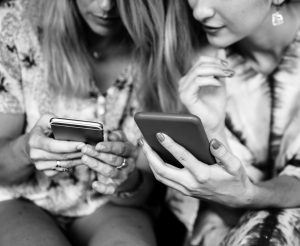By Carolyn Digby
It’s been nearly ten years since I recovered from my past eating disorder.
This fact hit me the other day and I must admit, it made me very proud of myself. Proud of the work I did in that time of my life to better my future. It’s strange; I feel so far removed from that part of my life, and feel like I am a completely different person looking back on that experience. My life is far beyond what I imagined was possible when I was 18, and my past self would be amazed at where I am today; not because of anything specific I’ve done that has been truly incredible, more so that I’m a functioning, independent adult who enjoys life and has ambitions. Yet that time of my life was a huge part of my developmental years and it would be unreasonable to completely dismiss it, as it is a part of my identity. It has contributed significantly to the career path I’m currently on, and has made me much more empathetic to other people’s struggles, as well as forced me to develop strong coping skills.
I believe all of our past experiences contribute to who we are today as individual people; the past is a part of the human experience and it would be irresponsible to completely dismiss it. This got me thinking about all the variations of experience following an eating disorder and during recovery: in the past year I’ve become very interested in the role social media plays in eating disorders, and through this I found that there are very large communities (predominantly through Instagram) that heavily identify with being recovered from an eating disorder.
There are social media accounts with huge, celebrity-like followin gs, offering a supportive community for those looking to connect with other recovered sufferers. Often, they are individuals who have recovered themselves, posting what they may eat throughout the day, before and after photos of their recovery process, or the various triggers they face on a daily basis and how they deal with them. I’ve noticed these recovery communities generally cater to a younger population; I can see the appeal in them to the age demographic that has grown up with technology. It is a really good feeling to know that you are not alone, and offers a great opportunity to connect with others who share a similar background and might be going through similar things. As well, these social media communities can serve a purpose encouraging people to hold themselves accountable; to not sink back into disordered behaviours. For the individual who owns the account, the comment sections are littered with notes of positivity and encouragement, as if they have their own cheerleading squad. Generally, it seems pretty positive in nature.
gs, offering a supportive community for those looking to connect with other recovered sufferers. Often, they are individuals who have recovered themselves, posting what they may eat throughout the day, before and after photos of their recovery process, or the various triggers they face on a daily basis and how they deal with them. I’ve noticed these recovery communities generally cater to a younger population; I can see the appeal in them to the age demographic that has grown up with technology. It is a really good feeling to know that you are not alone, and offers a great opportunity to connect with others who share a similar background and might be going through similar things. As well, these social media communities can serve a purpose encouraging people to hold themselves accountable; to not sink back into disordered behaviours. For the individual who owns the account, the comment sections are littered with notes of positivity and encouragement, as if they have their own cheerleading squad. Generally, it seems pretty positive in nature.
That said, I do have some questions. A huge part of an eating disorder is that it eats up your identity as a person; it takes up all of your time, focus, and energy, leaving little else left for you to identify with. I have to question if these social media recovery communities are simply an identity shift from “eating disorder” to “recovered eating disorder,” and if they may be keeping the person back from truly moving forward with their life and thriving beyond the disorder.
I was curious if any research had been done in this area, and wanted to see how these recovery accounts emotionally affect the individuals operating them and their followers; I wanted to see if they had a positive impact in their lives. Surprise! I couldn’t find any academic studies. I suppose this is a relatively new phenomenon. If you can find any, send them my way! However, I did find an interesting BuzzFeed article that outlines Instagram eating disorder recovery accounts:
The article raises some really good points from professionals in the eating disorder field. One doctor is concerned by the lack of professional presence in the communities, which is a valid criticism. If someone posts a picture with a message containing false information, or posts something overly triggering, it may cause damage to someone else. There are no professionally trained counsellors or dieticians monitoring the accounts. Another critic worries that users are replacing real treatment programs with the support of their social media followers, which can be dangerous to their health and cause them to avoid seeking professional help.
Eating disorders thrive in secrecy, and the more we talk about them, the more we take away their power.
However, another professional is very supportive of the communities, saying they offer an opportunity for positive dialogue between those who are seeking recovery, and that the communities offer much-needed support to people who may not have it from other figures in their lives. This makes sense; part of being human is relating to others, and it’s so nice to know that we are not in this life alone. Eating disorders thrive in secrecy, and the more we talk about them, the more we take away their power. It’s basically saying a big “eff-you” to eating disorders! As well, not everyone has easy access to eating disorder support services, and the communities are a great way to seek support from others.
Upon reflection, I realized that I personally don’t identify with “the identity of being recovered” (I suspect I am outside of the age range); I find I am just simply the person I am now. I don’t necessarily like the label for myself, as I feel it takes away from my other identities, such as daughter, girlfriend, friend, student, volunteer, and cat mom (I heavily identify with being a crazy cat lady). There is nothing wrong with recovery support communities or the identity they offer, but it is important that each of us chooses to do what is best in order to stay healthy and happy, and that we hold ourselves true and accountable to that practice.
Photo by rawpixel.com on Unsplash

Carolyn is currently completing graduate school, and working towards becoming a certified counsellor specializing in women’s mental health issues. In her spare time, she loves cuddling with her cat, reading, writing, and the outdoors.